Sid Meier’s Civilization VI review – one turn short of perfection
Does Civilization VI offer more at launch than Civ V did? Definitely. This doesn’t mean, though, that the developers managed to top Civilization V with all of its expansions – they almost did; except “almost” makes all the difference in this case.
The review is based on the PC version.
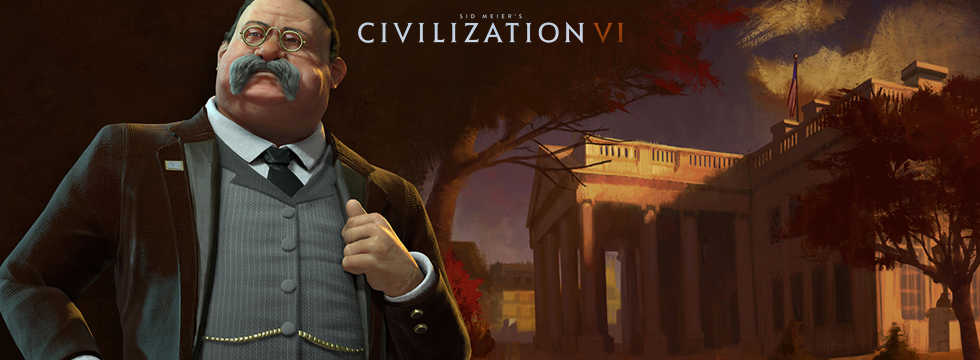
- Best visuals in the history of the franchise;
- One of the best day-one versions of the Civilization series;
- Attention to detail (fantastic fog of war, details of units adapted to different nations);
- Districts – a successful idea for refreshed urban development;
- Includes most of the additional content from Civ V (religion, archeology, espionage, etc);
- Many small changes and improvements (e.g. Corps, builders, a new system of city-states);
- Impressive music that evolves along with our civilization;
- The abundance of rules and settings (maps, duration, starting age, nations);
- In the future – mod support.
- Too much micromanagement;
- Poor AI;
- Minor bugs.
One hand is enough to count gaming franchises that have more than twenty years under their belt and regularly release new installments that never disappoint their fans. They may be better or worse – but never drop below certain quality standards. Civilization, the strategy game series bearing the name of Sid Meier, has certainly earned its right to be included in this elite group.
Civilization VI may on many levels be "just" an improved version of the previous installment, but it also introduces several major changes which have never been attempted so far in the series – the most important among them is of course the development of cities expanding beyond their initial tile. The final result of this creative mix of the old and the new gave us one of the best (among day-one versions), if not the best iteration of the series. To be honest, the game still does suffer from several trademark issues, spearheaded by mediocre AI, but this alone is not enough to prevent the One More Turn Syndrome from setting in – and this is probably the best recommendation one can give to a Civilization game.
Five horsemen of victory
The biggest complaint raised against Civilization V revolved around the content that was present in Civ IV but missing from its sequel – namely religion and espionage mechanics. The game may have held its ground with the new combat mechanics, but some players were fully satisfied only after the release of two expansions that introduced (or reintroduced) other methods of achieving victory. Developers from Firaxis realized – as opposed to, for example, the creators of The Sims – that this was not the way, and now, introducing the sixth installment, they included almost all of the solutions present in Civ V and its expansions. As a result, we got a very extensive production, in which – leading one of 19 available nations – we compete with other civilizations on the battlefield, in laboratories, and even „on stage” with the help of... hard rock, in a battle of (pop)cultures. That's because Civilization VI lets us win in as much as five different ways. The easiest way to achieve success is through religion, the most difficult one is the military conquest of the whole world; all of them, however, are well-developed. For this alone the developers deserve praise.
The guessing game
Civilization VI will most likely spawn some paid expansions (and the works are probably already underway). Let's pretend to be fortune-tellers then, and try to guess what they will include. I believe that one of them will introduce an expanded, in-depth diplomacy system and a new world congress – hopefully a better one than its rendition from Civ V. The devs may have removed a diplomatic victory in the latest installment, but they have also left some suggestions that it will be back. My other bet would be that the devs will expand the game with activities in the orbit and at seas – which was possible in Beyond Earth.
Civilizations change
Among the innovations that have emerged in Civilization VI, the introduction of districts is the most notable one, and with it comes a true revolution when it comes to city management. From now on, the vast majority of buildings will be erected not within the walls of our settlement but on the tiles surrounding it. All buildings will have to be located in districts, including dedicated types of districts such as military, scientific, religious, and so on (there's as many as twelve of them); some nations have unique districts. This means that taking care of urban development has become a more time-consuming process and requires – especially in the early phase of the game – greater precision, but also brings more fun. And this is only the beginning of the good changes in Civilization.
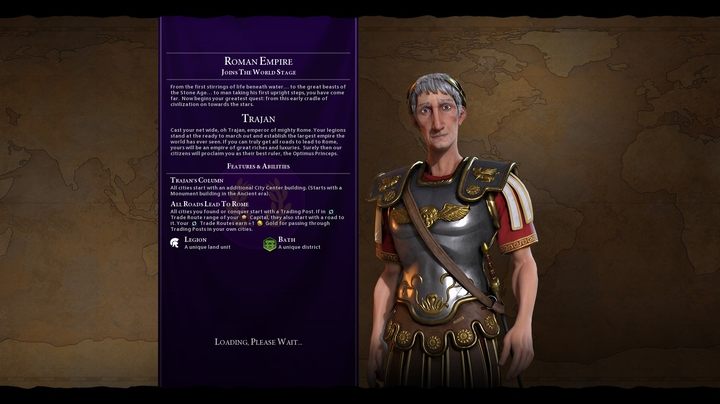
The bulk of those novelties deserve praise. I like how workers became builders, because now upgrading the tiles around the cities is fun once again – as the builders have a limited number of 'charges' and we can't automate their work. What became partly automatic is the creation of roads, because now it's the job of merchant caravans, and our only task is to give them a destination – this solution seems to be quite all right. I appreciate the interesting system of city-states, the excellent idea to introduce a second tree based on culture points (i.e. Civics), and reducing the number of great people and giving each of them individual characteristics.
Also the "Eureka” mechanics seem to be holding water rather well; 'eurekas' work as instant boosts, reducing the time required to research some techs and civics.The time reduction is huge (50%), which makes them very useful, and learning by heart how to acquire them is one of the keys to victory in online games. Another good thing is the system enabling us to form military corps and armies; we can organize our units and combine two (or later three) units in a single corps (army) which may be a bit weaker than individual units, but takes less space on the map and has better survivability. The biggest disappointment for me turned out to be the casus belli mechanic, which was to introduce a bit of Europe Universalis-like diplomacy to the game. In theory, its role was to put a rational leash on the actions of computer opponents, as well as prevent them from constantly declaring war for the dumbest of reasons. In practice, things aren’t looking that pretty, mainly because of the strange behavior of the AI; but more on that in a moment.
The visual rating of a game design is a matter of personal preferences and habits. I know from experience that for some players the design is too colorful and the leaders too cartoonish. For such arguments I can only answer that I, personally, find such aesthetics pleasant, and – which is an undeniable fact – the models and animations of leaders, as well as maps, are extremely detailed and polished.
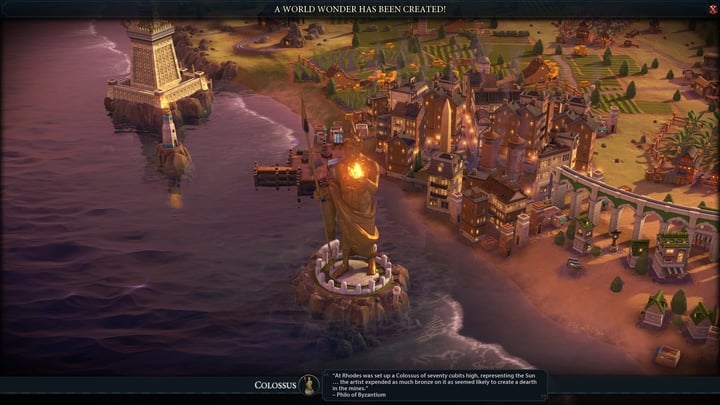
It is impossible to exhaust, in a single review, the list of all the changes introduced by the new Civilization as there's plenty of them; some of them, however, have already been discussed in more detail in one of our previous articles. What’s important is that these changes are generally for the better – they add a lot of depth to the game without overcomplicating it. Piecing together cities from individual districts, given the fact that the latter receive bonuses depending on the surrounding tiles and permanently occupy their tile, makes for a peculiar logic puzzle. Of course it takes a while to get used to the new interface and additional gameplay solutions, but everything is very intuitive while encompassing various mechanisms. That's how the best games are – easy to learn and hard to master. You can spend days getting to know Civilization VI – even after several dozen hours I didn't feel like I understood everything it has to offer. But the first steps went smoothly and without any major problems.
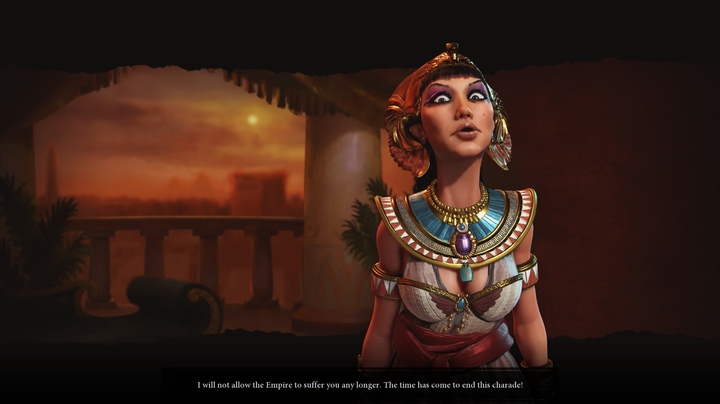
The more, the better?

In Civilization VI the music develops along with our civilization. Each nation has its own unique theme, which initially is played using simple instruments (e.g. pipes), later joined by a more sublime violin and eventually a bit of contemporary sounds near the modern age. You can hear more on the topic here. While not all of these songs resounded with me, the soundtrack is certainly diversified. The main theme, however, the one you can hear in the main menu, is truly enthralling.
In its long history, the Civilization series had tested various approaches to the question of "quantity vs quality". The older installments relied mostly on the former; in Civ V, however, mainly due to the decision to limit the number of units on a single tile to one, the devs have decided to emphasize quality. Having too many cities was troublesome, so any new conquest had to be carefully considered. This is where Civilization VI once again combines the new with the old, emphasizing unit quality while encouraging the player to found or conquer numerous settlements. Getting rid of the nationwide happiness level and moving it back to individual cities means that we needn’t worry if some of our settlements run out of luxury goods – our empire will hardly suffer from that.
Is pushing for greater empires a good move? I think it's debatable – as there are both advocates and opponents of this approach to be found. Personally, I'm somewhere in the middle. Indeed, when we have more than 20 cities, planning the subsequent districts or scrupulous upgrading of the land around settlements (we can no longer leave it to the computer) stops being fun. Such mass production leads to tons of unnecessary micromanagement. At the same time, it lets us feel the full scope of our civilization, which started from a small village surrounded by mountains to eventually extend on other continents in the endgame. If you like to manage scores of cities and units, however, you will be delighted. If you prefer a more compact civilization, there are smaller maps or... modifications that – I'm sure – will try to resolve this problem.
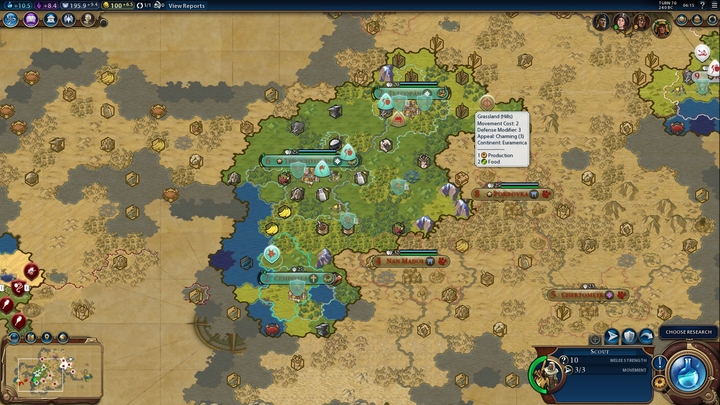
Civilization VI is the fairest of them all
The quality of some elements of Civilization VI is up for debate, but one of them is undeniably excellent: the game's visuals are a true work of art. Civ VI is not only the most beautiful iteration of the series, but also one of the best-designed strategy games in history. Its charms include colorful maps, on which we instantly notice the distinctive colors of individual districts (blue – scientific, red – military, etc.), as well as tons of highly-polished details. The fog of war, looking like an old map, is simply beautiful, and at the same functional and clear. What captivated me the most, however, were such small things as field upgrades that change along with the ages (in the modern age there's a small red tractor standing beside the farm) or unit details – when playing as Montezuma my knights wore the distinctive Aztec caps. I've noticed this detail after many hours of playing the Aztecs (which, by the way, are perfect for multiplayer, alongside Romans). I wonder just how many more of such little tidbits have I yet to discover?
I remember how years ago, when I was spending my time with Civilization II, one of my favorite activities was taking a peek inside a city – aside from the series' token spreadsheets and the global tile view there was also the button that enabled the visualization of our settlement. To date, the series had had a problem with actually showing us how great a cultural center we have created – our capital occupied just one tile, same as some random village in the middle of nowhere. In the sixth installment, thanks to the introduction of districts as well as kicking the wonders beyond the city walls, we can finally see, clear as day, how a powerful civilization is created and how we shape the surrounding environment. Combined with gorgeous visuals and the aforementioned details, the final result is stunning. It is without a doubt one of the strongest assets of the new game.
Hereditary defect
Civilization VI may be the most beautiful installment in the series, as well as the most comprehensive one on release – this doesn't mean, however, that the game is flawless. Initially it may well seem so, but after a few dozen hours we come to the conclusion that what the production’s weakest point is its poor AI. In this respect, Civ VI seems to be a revised version of its predecessor, and so the computer opponents behave more rationally, acting correspondingly to their agendas (one fixed and one random), but we still shouldn't expect any shrewdness or cunning from them – on higher levels they simply get certain bonuses (sometimes referred to as cheats by the players); they also become more aggressive.
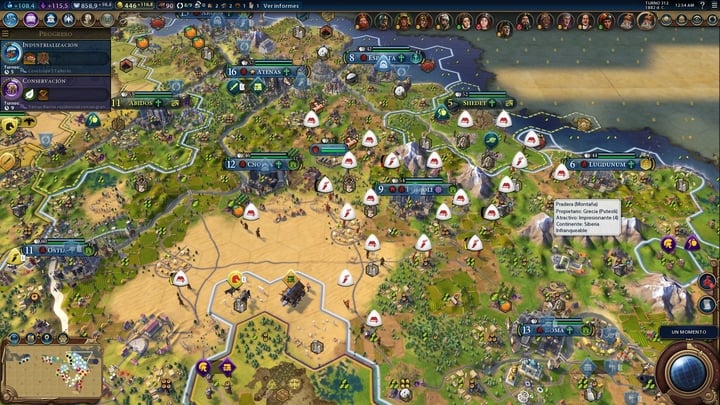
The new artificial intelligence is far from perfect – on the second highest level of difficulty ( "Immortal"), as that's what I mainly played, the computer would send a settler to the front lines (appreciate it, Cleopatra), sometimes forget to upgrade its units (Gandhi, I know that war elephants are awesome, but not in the age of the atom!) or simply wouldn’t use all of its units in combat. It's hardly a satisfying victory when we win thanks to our enemy's own stupidity. The AI-controlled opponent is simply an idiot, only privileged. That is the one thing I find very regrettable, because with a good artificial intelligence, this production would be almost perfect, and other minor issues wouldn't be enough to prevent me from giving the game a full score.
Incompetent AI is nothing new to the series, so if it didn’t bother you in the previous installment, you’ll find that the one in the latest installment actually performs a tad better. But if you are looking for a real challenge, the only thing you have left is to either focus your attention on online multiplayer or wait for fan modifications, such as Vox Populi. It's a bit sad that enthusiasts do a better job than the creators of the game when it comes to such things as balance and AI – but there are games other than Civilization that share the same treatment. As for Civ VI's shortcomings, I must mention the sometimes vague warnings from computer rivals and various minor bugs. On larger maps in later eras, turns tend to last a bit too long – no longer than in Civilization V, but was it really that hard to improve this aspect? I also wish that the endgame videos matched the quality of the rest of the visuals and spectacular trailers – though, to be honest, nobody plays Civilization to watch them.
On some computers, it takes ages (pardon the pun) for the game to load – fortunately, once the map is loaded, everything goes back to normal. While I haven't experienced this issue myself (perhaps because I had the game installed on an SSD), I hope that it will be resolved quickly.
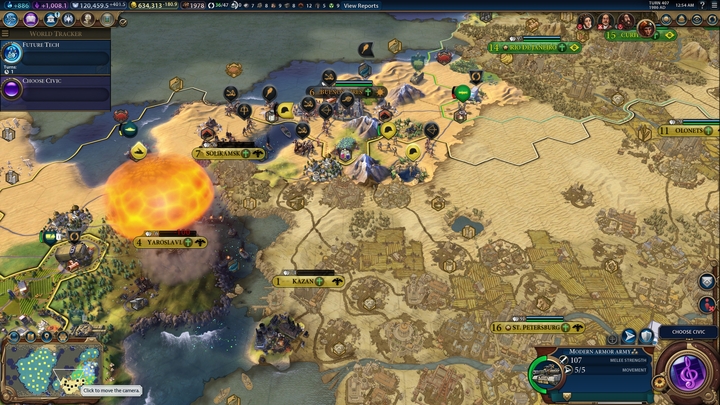
Just one more turn
The new Civilization does not disappoint. Five ways to achieve victory, improved system of city-states, districts and wonders moved beyond city walls, and fantastic visuals – all this adds up to a very good strategy game. In short, it can be encapsulated in the following phrase: Civilization VI causes the famous One More Turn Syndrome. This installment will eat up dozens or even hundreds of hours of your time, even without modifications (these will come along soon) and expansions, which will extend the life of this game even further.
Is Civilization VI better than the day-one version of Civilization V? Without a doubt. Is it better than Civ V with its two expansions and the best mods? Not yet – but it is also different. It provides a solid foundation, probably the best in the cycle, but for the game to be perfect the AI needs to be improved and the gameplay perhaps a bit expanded. I am sure that within the next year we will have the best 4X strategy on the market on our hands. Until then it remains "only" a very good one.
Sid Meier's Civilization VI
Sid Meier’s Civilization VI review – one turn short of perfection
Does Civilization VI offer more at launch than Civ V did? Definitely. This doesn’t mean, though, that the developers managed to top Civilization V with all of its expansions – they almost did; except “almost” makes all the difference in this case.

